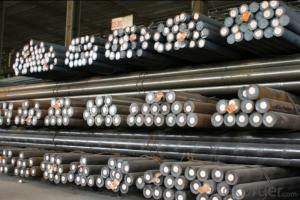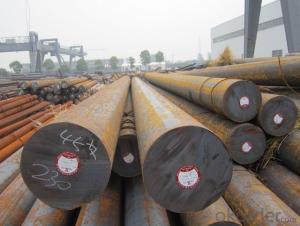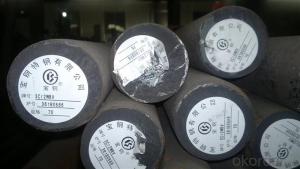AISI 1045 Round bar Special Steel Carbon Steel
- Loading Port:
- China main port
- Payment Terms:
- TT OR LC
- Min Order Qty:
- 25 m.t.
- Supply Capability:
- 10000 m.t./month
OKorder Service Pledge
OKorder Financial Service
You Might Also Like
Item specifice
Chemical Composition(GB)%
| standard | C | Si | Mn | P | S | Ni | Cr | Cu |
| 45 | 0.42-0.50 | 0.17-0.37 | 0.50-0.80 | ≤0.035 | ≤0.035 | ≤0.30 | ≤0.15 | ≤0.25 |
| S45C | 0.42-0.48 | 0.15-0.35 | 0.60-0.90 | ≤0.030 | ≤0.035 | ≤0.20 | ≤0.20 | ≤0.230 |
Heat Treatment
| Item | Temperature ℃ | Hardness |
| normalizing | 850-870 | 170-217HBS |
Characterstics
| 1.Commonly used in carbon quenched and tempered steels |
| 2.Higher strength and better cutting processability |
Applications
| 1.Suitable for cold stamping die wedge, screw, plate, etc |
| 2.Other parts of cold work mould |
| 3.Used for hot forging, die casting, hot stamping and hot mould parts |
Product show

Workshop show

FAQ:
1, Your advantages?
professional products inquiry, products knowledge train (for agents), smooth goods delivery, excellent customer solution proposale
2, Test & Certificate?
SGS test is available, customer inspection before shipping is welcome, third party inspection is no problem
3, Payment Terms?
30% TT as deposit and 70% before delivery.
Irrevocable L/C at sight.
4, Trading Terms?
EXW, FOB, CIF, FFR, CNF
5, After-sale Service?
We provides the services and support you need for every step of our cooperation. We're the business partner you can trust.
For any problem, please kindly contact us at any your convenient time.
We'll reply you in our first priority within 24 hours.
- Q:What are the main characteristics of creep-resistant steel forgings?
- Creep-resistant steel forgings have several key characteristics. They possess excellent resistance to high temperatures and are capable of withstanding prolonged exposure to elevated temperatures without undergoing significant deformation. These forgings also exhibit superior strength, toughness, and resistance to corrosion and oxidation. Additionally, they have low thermal expansion and good dimensional stability, ensuring their structural integrity remains intact even under extreme conditions. Overall, creep-resistant steel forgings are specifically designed to maintain their mechanical properties and structural integrity under long-term, high-temperature applications.
- Q:How is special steel used in the manufacturing of cutting tools?
- Special steel is used in the manufacturing of cutting tools because of its high hardness, toughness, and wear resistance. This type of steel can be heat-treated to achieve the desired hardness and can retain its cutting edge for a longer period. It is commonly used in the production of drills, saw blades, and milling cutters to ensure efficient and precise cutting operations.
- Q:How does special steel perform in cryogenic strength?
- Special steel performs well in cryogenic strength. It is specifically designed to maintain its strength and toughness at extremely low temperatures. This allows it to withstand the harsh conditions of cryogenic environments without losing its mechanical properties.
- Q:How is special steel used in the production of aircraft components?
- Special steel is used in the production of aircraft components due to its exceptional strength, durability, and resistance to corrosion. It is commonly utilized in critical areas such as engine components, landing gear, and structural parts where high performance and reliability are essential. The special properties of steel allow for the creation of lightweight yet strong components, ensuring the safety and efficiency of aircraft operations.
- Q:What are the future trends in special steel manufacturing?
- Advancements in technology, sustainability, and the development of new alloys are expected to shape the future of special steel manufacturing. Technology will play a significant role, with automation and robotics being integrated into the production process. This integration will lead to improved efficiency, precision, and reduced labor costs. Quality control will also be enhanced, allowing for the production of more complex and customized steel products. Sustainability will be a key focus in the industry, driven by the growing environmental consciousness. Companies will seek to reduce their carbon footprint by adopting cleaner production methods, such as utilizing renewable energy sources and implementing recycling programs to minimize waste. Additionally, there will be a shift towards developing greener alloys with reduced environmental impact. The development of new alloys will be crucial in meeting the evolving needs of various industries. Material science advancements will enable special steel manufacturers to create alloys with enhanced properties, including increased strength, durability, corrosion resistance, and heat resistance. These new alloys will cater to the increasing demand for high-performance materials in sectors like aerospace, automotive, energy, and construction. Furthermore, the future of special steel manufacturing will be influenced by the rising demand for lightweight materials. Industries striving for improved fuel efficiency and reduced emissions will require special steel alloys that offer high strength-to-weight ratios. This will drive research and development efforts towards creating lighter yet stronger steel products. In conclusion, the future of special steel manufacturing will be shaped by advancements in technology, sustainability, and the development of new alloys. These trends will drive increased automation, cleaner production methods, and the creation of innovative alloys to meet the changing needs of various sectors.
- Q:What are the common heat treatment methods used for special steel?
- There are several common heat treatment methods used for special steel to improve its mechanical properties and enhance its performance. Some of these methods include: 1. Annealing: This process involves heating the steel to a specific temperature and then cooling it slowly to relieve internal stresses and create a refined microstructure. Annealing helps to improve the machinability and ductility of the steel. 2. Normalizing: Normalizing is a heat treatment method that involves heating the steel to a temperature above its critical point and then cooling it in still air. This process helps to refine the grain structure of the steel, improve its toughness, and enhance its strength. 3. Quenching: Quenching is a rapid cooling process that involves immersing the steel in a quenching medium, such as water, oil, or polymer. This method is used to increase the hardness and strength of the steel by forming a hard martensitic structure. However, quenching can also introduce internal stresses and reduce the steel's toughness, so it is often followed by tempering. 4. Tempering: Tempering is a heat treatment method that involves reheating the quenched steel to a specific temperature and then cooling it gradually. This process helps to relieve internal stresses, reduce hardness, and improve the toughness and ductility of the steel. Tempering also helps to enhance the steel's resistance to brittle fracture. 5. Austempering: Austempering is a heat treatment method that involves quenching the steel to a temperature just above its martensitic transformation range and then holding it at this temperature until the austenite transforms into bainite. This process produces a unique microstructure that provides a combination of high strength and good toughness. 6. Martempering: Martempering is similar to austempering, but the steel is quenched to a temperature just below its martensitic transformation range and then held at this temperature until the transformation is complete. Martempering produces a microstructure with improved strength and toughness compared to conventional quenching. These heat treatment methods are commonly used for special steel to tailor its properties to specific applications and requirements. The choice of method depends on factors such as the desired mechanical properties, the steel's composition, and the intended use of the final product.
- Q:How does special steel contribute to the shipbuilding industry?
- Special steel contributes to the shipbuilding industry in several ways. Firstly, special steel offers enhanced strength and durability, making it an ideal material for constructing various components of ships. This includes the hull, decks, bulkheads, and other structural elements that need to withstand the harsh marine environment and heavy loads. Special steel also provides excellent resistance to corrosion and abrasion, which is crucial for ships that are constantly exposed to saltwater and other corrosive agents. This ensures that the ship remains in good condition for a longer lifespan, reducing maintenance costs and increasing operational efficiency. Moreover, special steel offers superior weldability and formability, allowing shipbuilders to create complex shapes and structures with ease. This flexibility in design enables the construction of innovative and efficient ship designs, such as large container vessels, offshore oil rigs, and naval warships. In addition, special steel is often used for manufacturing critical components like propeller shafts, rudders, and engine parts. These components require high strength, toughness, and resistance to fatigue, as they are subjected to extreme forces and vibrations during operation. Special steel's unique properties ensure the reliability and performance of these crucial ship parts. Furthermore, special steel contributes to the shipbuilding industry by enabling the construction of lightweight ships without compromising strength and safety. This helps reduce fuel consumption, leading to improved energy efficiency and lower greenhouse gas emissions. As environmental regulations become increasingly stringent, special steel plays a vital role in making ships more sustainable and eco-friendly. Overall, special steel is an essential material in the shipbuilding industry due to its exceptional strength, durability, corrosion resistance, weldability, formability, and lightweight properties. Its use not only ensures the safety and longevity of ships but also facilitates the development of advanced ship designs and contributes to the industry's overall sustainability.
- Q:Can special steel be used in the wind turbine manufacturing industry?
- Yes, special steel can be used in the wind turbine manufacturing industry. Special steel, such as high-strength or corrosion-resistant alloys, is often used in the construction of wind turbine components due to its durability, strength, and resistance to harsh environmental conditions. These specialized steel alloys help ensure the longevity and performance of wind turbines in the renewable energy industry.
- Q:How is structural steel used in building construction?
- Structural steel is extensively used in building construction due to its high strength and versatility. It serves as the primary framework for buildings, providing support and stability. The steel beams and columns are used to create the skeleton of the structure, spanning large distances and allowing for open floor plans. Additionally, steel is used for various other elements such as stairs, handrails, and roof trusses. Its durability, fire resistance, and ability to withstand extreme weather conditions make it an ideal material for constructing high-rise buildings, industrial facilities, and bridges.
- Q:What are the requirements for special steel used in battery technology?
- Special steel used in battery technology must meet several requirements to ensure optimal performance and safety. Firstly, high corrosion resistance is crucial as batteries often contain corrosive electrolytes that can degrade the steel over time. Special steel should possess excellent resistance to corrosion, preventing any chemical reactions that could compromise the battery's integrity and lifespan. Secondly, good mechanical strength is essential to withstand the internal pressures and external forces that batteries are subjected to during operation and handling. It must be able to resist deformation and maintain its structural integrity, even under high stress conditions. Thirdly, high thermal conductivity is desirable in special steel used in battery technology. Efficient heat dissipation is crucial for preventing overheating, which can reduce battery performance and potentially lead to safety hazards. Steel with good thermal conductivity allows for effective heat transfer, ensuring that the battery can operate within safe temperature limits. Additionally, the steel should have low electrical resistivity to minimize energy losses due to electrical resistance. This ensures efficient energy transfer within the battery and reduces power dissipation, increasing overall battery efficiency. Furthermore, special steel used in battery technology should be compatible with the other materials used in the battery, such as electrodes, electrolytes, and separators. Compatibility is crucial to prevent any chemical reactions or detrimental interactions that could compromise the battery's performance or lifespan. Finally, environmental sustainability is increasingly important in modern battery technology. Special steel used in batteries should be produced using environmentally friendly methods, with minimized carbon footprint and reduced use of scarce resources. Overall, special steel for battery technology should possess high corrosion resistance, mechanical strength, thermal conductivity, low electrical resistivity, compatibility with other battery materials, and environmental sustainability to ensure optimal performance and safety in batteries.
1. Manufacturer Overview |
|
|---|---|
| Location | |
| Year Established | |
| Annual Output Value | |
| Main Markets | |
| Company Certifications | |
2. Manufacturer Certificates |
|
|---|---|
| a) Certification Name | |
| Range | |
| Reference | |
| Validity Period | |
3. Manufacturer Capability |
|
|---|---|
| a)Trade Capacity | |
| Nearest Port | |
| Export Percentage | |
| No.of Employees in Trade Department | |
| Language Spoken: | |
| b)Factory Information | |
| Factory Size: | |
| No. of Production Lines | |
| Contract Manufacturing | |
| Product Price Range | |
Send your message to us
AISI 1045 Round bar Special Steel Carbon Steel
- Loading Port:
- China main port
- Payment Terms:
- TT OR LC
- Min Order Qty:
- 25 m.t.
- Supply Capability:
- 10000 m.t./month
OKorder Service Pledge
OKorder Financial Service
Similar products
New products
Hot products
Related keywords






























